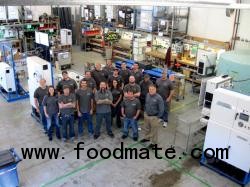 ne International is currently installing twenty-seven ozone generating units in fruit warehouses throughout the Wenatchee (WA) area.
ne International is currently installing twenty-seven ozone generating units in fruit warehouses throughout the Wenatchee (WA) area. “We’re using ozone to eradicate decay,” said Walt Hough, treasurer of Auvil Fruit in Orondo, one of three major packing and storage facilities expanding their use of ozone.
“Ozone has worked for us in terms of efficacy and has provided a major financial benefit by reducing losses due to decay,” added Hough. Auvil Fruit, who grow and pack apples and cherries, began using ozone ten years ago in a single storage room. Today, they use ozone throughout their storage operation.
Ozone kills airborne and surface microorganisms, shuts down the sporulation process, and consumes ethylene produced by ripening. Reducing ethylene greatly slows the ripening process which, in turn, extends shelf life.
Richard Thomason, plant engineer at Gebbers Farms in Brewster, began working with ozone in the 1990s for a fresh sliced apple venture. “Ozone is one of the best sanitizers,” said Thomason, who has been with Gebbers Farms since 1974 and the plant engineer for the past ten years.
Ozone International’s process generates ozone from atmospheric oxygen and delivers a defined, low dose, concentration of gaseous ozone for cold storage applications.
Ozone is a natural alternative to using chemicals to preserve fruit in storage.
“We use zero post-harvest fungicides,” added Hough, who began working for Auvil Fruit in 1976. “Using ozone has been a giant chemical-free tool for us.”
After oxidizing microorganisms, ozone immediately reverts to pure oxygen leaving no residue while maintaining the fruit’s taste, texture and smell characteristics. Ozone can be used alone or as a complementary measure with various post-harvest preservation techniques.
“We initially tested ozone in two controlled atmosphere (CA) rooms and found it greatly reduced mold and decay,” said Thomason. “Then we tried eight rooms with ozone and got the same result with our Galas. They were firmer and had better flavor than the previously run non-treated fruit.” Today, twenty rooms are treated with ozone and Gebbers Farms plans to add another sixteen rooms this year.
Ozone International Cold Storage also provides ozone monitors, a local programmable logic controller (PLC) and closed-loop control that ensures optimum safety and efficacy. Work areas are constantly monitored to ensure ozone concentrations are well within WISHA (the Washington Industrial Safety and Health Act) and OSHA standards. It’s a single source solution.
“Ozone International is really thorough and have done a great job,” concluded Hough.
“It’s been excellent,” agreed Thomason. “They are easy to work with and very proactive.”
The installations are expected to be completed by mid-August.
Located on Bainbridge Island, Ozone International is a leading manufacturer of ozone-based sanitation and cleaning systems for the food processing industry. The company received Seattle Business magazine’s 2013 Manufacturer of the Year award in the Small Firms category.





